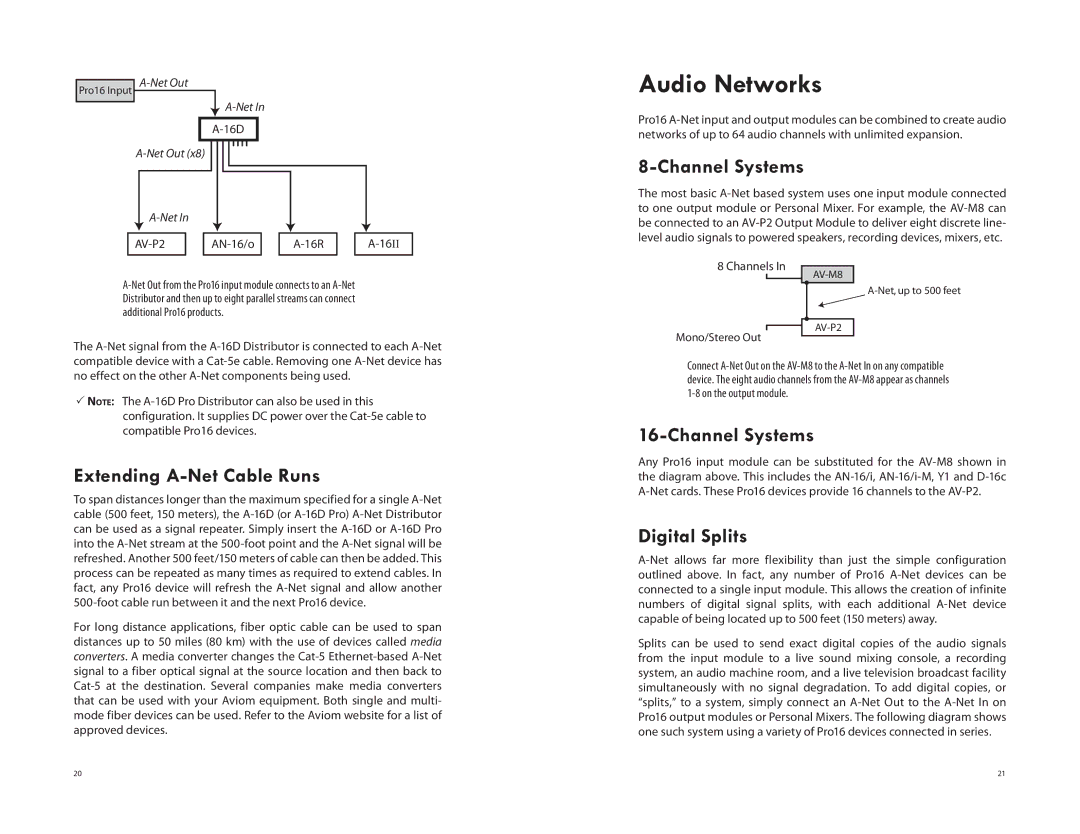compatible device with a Cat-5e cable. Removing one A-Net device has no effect on the other A-Net components being used.
PNote: The A-16D Pro Distributor can also be used in this configuration. It supplies DC power over the Cat-5e cable to compatible Pro16 devices.
Extending A-Net Cable Runs
To span distances longer than the maximum specified for a single A-Net cable (500 feet, 150 meters), the A-16D (or A-16D Pro) A-Net Distributor can be used as a signal repeater. Simply insert the A-16D or A-16D Pro into the A-Net stream at the 500-foot point and the A-Net signal will be refreshed. Another 500 feet/150 meters of cable can then be added. This process can be repeated as many times as required to extend cables. In fact, any Pro16 device will refresh the A-Net signal and allow another 500-foot cable run between it and the next Pro16 device.
For long distance applications, fiber optic cable can be used to span distances up to 50 miles (80 km) with the use of devices called media converters. A media converter changes the Cat-5 Ethernet-based A-Net signal to a fiber optical signal at the source location and then back to Cat-5 at the destination. Several companies make media converters that can be used with your Aviom equipment. Both single and multi- mode fiber devices can be used. Refer to the Aviom website for a list of approved devices.
Connect A-Net Out on the AV-M8 to the A-Net In on any compatible device. The eight audio channels from the AV-M8 appear as channels 1-8 on the output module.
16-Channel Systems
Any Pro16 input module can be substituted for the AV-M8 shown in the diagram above. This includes the AN-16/i, AN-16/i-M, Y1 and D-16c A-Net cards. These Pro16 devices provide 16 channels to the AV-P2.
Digital Splits
A-Net allows far more flexibility than just the simple configuration outlined above. In fact, any number of Pro16 A-Net devices can be connected to a single input module. This allows the creation of infinite numbers of digital signal splits, with each additional A-Net device capable of being located up to 500 feet (150 meters) away.
Splits can be used to send exact digital copies of the audio signals from the input module to a live sound mixing console, a recording system, an audio machine room, and a live television broadcast facility simultaneously with no signal degradation. To add digital copies, or “splits,” to a system, simply connect an A-Net Out to the A-Net In on Pro16 output modules or Personal Mixers. The following diagram shows one such system using a variety of Pro16 devices connected in series.

